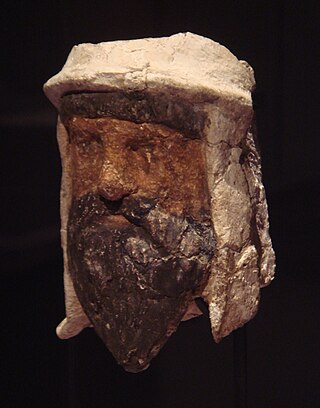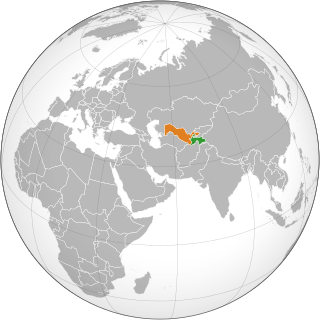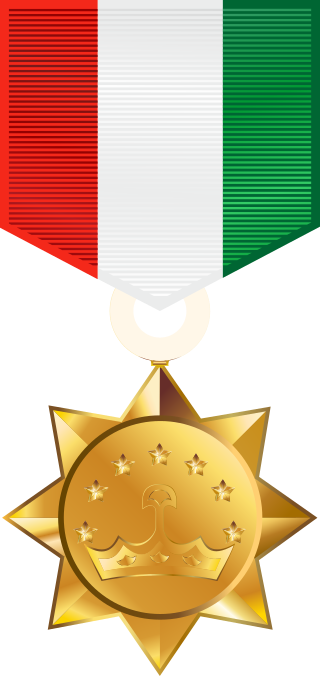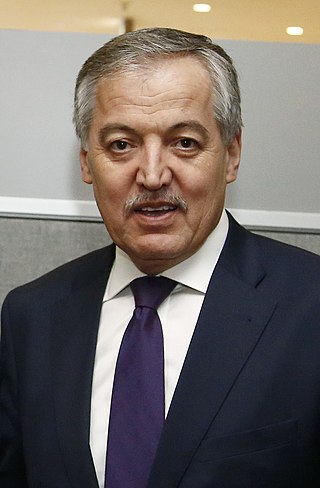
Tajikistan harkens to the Samanid Empire (819–999). The Tajik people came under Russian rule in the 1860s. The Basmachi revolt broke out in the wake of the Russian Revolution of 1917 and was quelled in the early 1920s during the Russian Civil War. In 1924, Tajikistan became an Autonomous Soviet Socialist Republic of the Soviet Union, the Tajik ASSR, within Uzbekistan. In 1929, Tajikistan was made one of the component republics of the Soviet Union – Tajik Soviet Socialist Republic – and it kept that status until gaining independence 1991 after the dissolution of the Soviet Union.
The politics of Tajikistan takes place in a framework of a presidential republic, whereby the President is both head of state and head of government, and of a multi-party system. Legislative power is vested in both the executive branch and the two chambers of parliament.

The president of Tajikistan is the head of state and de facto head of government of the Republic of Tajikistan. The president heads the executive branch of the country's government and is the commander in chief of the Armed Forces of Tajikistan.

Emomali Rahmon (; born Emomali Sharipovich Rahmonov, Tajik: Эмомалӣ Шарипович Раҳмонов, romanized: Emomalí Šarip Rahmon; ; October 5, 1952, is a Tajik politician who has been serving as 3rd President of Tajikistan since 16 November 1994. Previously he was the Chairman of the Supreme Assembly of Tajikistan, as the de facto head of state from 20 November 1992 to 16 November 1994. Since 18 March 1998, he has also served as the leader of the People's Democratic Party of Tajikistan, which dominates the Parliament of Tajikistan. On 30 September 1999, he was elected vice-president of the UN General Assembly for a one-year term.
Rahmon Nabiyevich Nabiyev, also spelled Rakhmon Nabiev, was a Tajik politician who served as the First Secretary of the Communist Party of Tajikistan from 1982 to 1985 and twice as the 2nd President of Tajikistan from 23 September 1991 to 6 October 1991 and from 2 December 1991 to 7 September 1992. He was also partly responsible for the Tajik Civil War. Rising out of the regional nomenklatura, Nabiyev ascended to power in 1982 as First Secretary of the Communist Party of Tajikistan. In 1985, he was ousted in a corruption scandal.

The Tajikistani Civil War, also known as the Tajik Civil War, began in May 1992 and ended in June 1997. Regional groups from the Garm and Gorno-Badakhshan regions of Tajikistan rose up against the newly-formed government of President Rahmon Nabiyev, which was dominated by people from the Khujand and Kulob regions. The rebel groups were led by a combination of liberal democratic reformers and Islamists, who would later organize under the banner of the United Tajik Opposition. The government was supported by Russian military and border guards.

The Communist Party of Tajikistan is a communist party in Tajikistan, and the oldest political party in the country. The party was founded on 6 January 1924 and was the ruling party of the Tajik Autonomous Soviet Socialist Republic from 1924 to 1929 and the Tajik Soviet Socialist Republic from 1929 to 1990 as part of the Soviet Union as a republican branch of the Communist Party of the Soviet Union. It was banned in 1991 following the 1991 coup.

Bobojon Gafurovich Ghafurov or Babadzan Gafurovich Gafurov was a Tajik historian, academician, and the author of several books published in Russian and Tajik, including History of Tajikistan and The Tajiks.

The prime minister of Tajikistan is the title held by the head of government of Tajikistan. After the president, the prime minister is second most powerful person of the country. The prime minister coordinates the work of the Cabinet and advises and assists the president in the execution of the functions of government.

Qahhor Mahkamov was a Tajik politician who served as First Secretary of the Communist Party of Tajikistan from 1985 to 1991 and was the first President of Tajikistan from November 1990 until his fall in the August 1991 coup.
Qadriddin Aslonov was acting President of Tajikistan from 31 August to 23 September 1991.
Akbarsho Iskandarov is a Tajik politician who was twice acting president of Tajikistan. He first served as acting president from October 6, 1991, to December 2, 1991, when Rahmon Nabiyev stepped down to fight Tajikistan's first presidential election. Nabiyev won the election and took over as the first popularly elected president in the country's history, but resigned in September 1992, following a coup d'état. Iskandrov again took the interim presidency and later resigned on 20 November 1992, after which the office of president was abolished and Emomali Rahmon was installed as head of state. Iskandrov also served as ambassador to Turkmenistan and Kazakhstan.
Ghafurov is a town in Ghafurov district, Sughd Region, Tajikistan. It has a population of 20,600, up from 18,900 in the 1989 census. The town was created in 1965, and until 1978 had the name Sovietabad. In that year it was renamed in honor of Bobojon Ghafurovich Ghafurov, commemorating his term of office as the First Secretary of the Central Committee of the Communist Party of Tajikistan from 1946 to 1956.

Tajikistan–Uzbekistan relations refers to the relations between the Republic of Tajikistan and the Republic of Uzbekistan.

The title Hero of Tajikistan is a state award of Tajikistan. It was first awarded in 1996 and was awarded for service to the implementation of domestic and foreign policy.

The Ministry of Foreign Affairs of Tajikistan is a government ministry of Tajikistan. It is the central executive authority exercising state administration in the sphere of relations of the Republic of Tajikistan with foreign countries and international organizations. It carries out its activities in cooperation with other central executive bodies, local government bodies, legal entities. The Ministry of Foreign Affairs of the Republic of Tajikistan has the status of a legal entity, its own seal, stamps, and bank accounts. The current Minister is Sirojiddin Muhriddin.

The 1992 Tajikistan protests, also known as the Tajikistani Revolution, were nonviolent, bloodless protests and demonstrations against the results of the 1991 Tajik presidential election. These results were thought to be rigged and in favour of the president Rahmon Nabiyev. Opposition rallies erupted on 26 March 1992 but demonstrations became large-scale by May, at the onset of violence. These series of peaceful protests would lead to the bloody Tajikistani Civil War.
The Popular Front of Tajikistan was a politicized paramilitary movement composed of volunteers that fought for the government during the Tajik Civil War. Up to 8,000 fighters served as part of the front.













